November 10, 2016
Edited by David Sanders
Specimen Days
1577—Jacob Cats, [Father Cats], Dutch grand pensionary/poet (Houwelyck), is born.
1759—Frederich von Schiller, Germany, poet/lyricist (Ode to Joy) (d. 1805), is born.
1834—Jose Hernandez, Argentina poet (MartinFierro), is born.
1879—Nicholas Vachel Lindsay, US, poet (Gen William Booth enters Heaven), is born.
1884—Jan van Nijlen, Flemish poet/author (Bird Phoenix), is born.

The Moon's The North Wind's Cooky
The Moon's the North Wind's cooky.
He bites it, day by day,
Until there's but a rim of scraps
That crumble all away.
The South Wind is a baker.
He kneads clouds in his den,
And bakes a crisp new moon that . . . greedy
North . . . Wind . . . eats . . . again!
—Vachel Lindsay
“The Moon’s the North Wind’s cooky. / He bites it, day by day, / Until there’s but a rim of scraps” – Vachel Lindsay
World Poetry
Anne Frank Poem, Handwritten for a Friend, Goes on Sale

A short poem by Anne Frank written in Amsterdam in 1942 and autographed by the teenager is expected to fetch up to €50,000 (£44,000) at auction. The handwritten eight-line poem was written in the “poezie album”, or friendship book, of the older sister of Frank’s classmate and best friend Jacqueline van Maarsen, according to Dutch auction house Bubb Kuyper. The first four lines of the poem can be found in a 1938 periodical, but the next four are not traceable, said Bubb Kuyper, which has put a guide price of €30,000 to €50,000 on the poem.
A short poem by Anne Frank written in Amsterdam in 1942 and autographed by the teenager is expected to fetch up to €50,000 at auction.
Recent Reviews
Refreshing Breaks: How Fragmented Stories Can Be Fulfilling Reading
by Chris Power
“Reading can be freefall,” runs the blurb on the back of Anne Carson’s new poetry collection, one of several recently published books to offer readers a more interactive way to engage with the printed word. Historically, fragmentation has been used as a troubling effect, or to indicate a subject under stress. These books, however, attempt to unleash the fragment’s liberating force. The effect can be exhilarating.
Castles and Islands by Joshua Edwards
by Christopher Kempf
Like Elizabeth Bishop, whose legacy he takes up, Joshua Edwards is a poet of travel; I am not the first to make the comparison nor, I imagine, will I be the last. Yet if that term—“poet of travel” or, worse, “travel poet”—seems tinged with the middlebrow, more reminiscent of Eat, Pray, Love than Italo Calvino, it is because invoking it as a kind of summative description means, in the case of both writers, mistaking subject matter for intellectual content, for ideas; to call either writer, that is, a “poet of travel” is to miss how, for both Bishop and Edwards, travel serves in large part as a heuristic, what Richard Hugo would call a “triggering subject” by which to pursue broader questions about the self and its relation to world.
“Something’s missing”
by David Godkin
Robyn Sarah once wrote “A good poem always knows more about itself than even its author does. If parts of it seem baffling, the cue is not to be afraid, but to ask the poem what they mean.” What parts of Sarah's poems in My Shoes Are Killing Me mean cannot be considered separately from her larger themes of time and memory and her habitual insistence upon the Now: to feel the weight of each moment in her life and to convert this into poetry so that readers feels it in theirs.
Like Elizabeth Bishop, whose legacy he takes up, Joshua Edwards is a poet of travel.
Broadsides
‘Transgressive Circulation’: Translation and the Threat of Foreign Influence
by Johannes Göransson
At the AWP writers’ conference in Minneapolis a couple of years ago, I attended a panel on Paul Celan’s poetry. In the Q & A that followed the panel, the first question was ‘How can we make sure that young American poets are not improperly influenced by Celan’s poetry without truly understanding it?’ The panel responded by offering a variety of possible solutions, such as reading the extensive literature about the poet or reading his letters and journal entries that have been published as well. However, none of them asked why it should be that this ‘improper influence’ should be the audience member’s biggest concern.
Robert Conquest’s Muses
by Cynthia Haven
Until a few days before his death last year at the age of ninety-eight, Robert Conquest was busy finishing his memoir, completing a poem or two, and sending off a steady stream of letters to a wide international circle of friends. As always, his serenely successful life was divided between poetry and prose. Most of the obituaries concentrated on his groundbreaking work as a historian: The Great Terror (1968), Harvest of Sorrow (1986) and other books had exposed the genocidal horrors of Stalin’s regime and earned Conquest the disapprobation of left-wing intellectuals and the admiration of, among others, Ronald Reagan and Margaret Thatcher.
Sing for the Lost Souls
by Philip Terman
“I do not like you to waste your time on me.”
Just yesterday an article was posted on the ABC.net website with the headline: “Syria conflict: World ‘turning a blind eye’ to Carnage in Aleppo, Says Doctors Without Borders.” Muskilda Zancada, the head of the mission in Syria, “is deeply concerned about the growing death toll in the Northern town of Aleppo.” It’s not difficult to find images of Aleppo’s buildings bombed to rubble, cars set on fire, air full of smoke and debris, a photo of a hospital after an airstrike in which the last pediatrician in the city was killed, showing a man holding a dead baby boy, back-dropped by the reduced-to-bricks-and-mortar hospital.
Why Bother with Poetry?
by A. E. Stallings
It’s OK not to like poetry. I don’t really follow sports. Some like one thing, some like another, as Horace says. Poetry was around before the alphabet (there is even a theory that the Greek alphabet was invented for the purpose of recording it) and is perfectly adapted to dissemination on the internet and, unlike novels, for reading on small screens. Why all the concern lavished on it – the United States has a National Poetry Month (April, of course), and there is an International Poetry Day, as well as an assortment of other examples of embarrassing boosterism? Poetry is not useful, and it is in every culture.
Until a few days before his death last year at the age of ninety-eight, Robert Conquest was busy finishing his memoir.
Drafts & Fragments
Home of Openly Gay Poet James Merrill Designated a National Landmark

The James Merrill House in Stonington, Conn., is being designated as a national historic landmark. Named after openly gay writer James Merrill, the house is among 10 properties newly recognized as having exceptional value to the nation.
Spotlight on War Poets
by Danielle Mohlman
Veterans Day is coming up and here at My Poetic Side we’re honoring our military veterans the best way we know how: by shining a spotlight on some of our favorite war poets. So as we thank our veterans for their military service, we’ll be curling up with the words of these notable poets.
Robert Browning is the First Poet Ever to Be Recorded – and He Muffs the Lines of His Own Poem
by Cynthia Haven
This is the first time ever a poet’s voice was recorded. And he muffed the lines of his own poem. The recording contains the voice of the eminent poet Robert Browning (1812 – 1889), recorded in a dinner party given by Browning’s friend the artist Rudolf Lehmann, on May 6th, 1889. (Browning died the following December.)
The James Merrill House in Stonington, Conn., is being designated as a national historic landmark.
Poetry In the News
In ‘Whitman’s Descendants,’ Photographing Some of America’s Greatest Living Poets
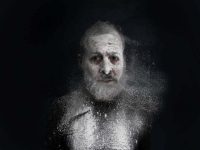
In 1860, writing the third of six editions of his book “Leaves of Grass,” behemoth of American poetry Walt Whitman proclaimed what would follow him. “I announce greater offspring, orators, days, and then depart,” he wrote in the book’s final poem, a tribute to everything he would never live to witness. Now, generations later, photographer B.A. Van Sise — who descended from Whitman’s oldest sister and also his first cousin — has set out to create a portrait of his legacy. “Whitman’s Descendants” is a striking set of portraits documenting the heart of American poetry today, one that bears an urgent connection to Whitman and the issues of his day.
Stanford Acquires an Important Collection of Nobel Poet Joseph Brodsky’s Papers
When the Soviet Union expelled the Russian poet Joseph Brodsky in 1972, he already had a few friends waiting for him in the West. One of them, Diana Myers, would remain a confidante until the Nobel laureate’s death in 1996. The London home she shared with her husband, the translator Alan Myers, became his English pied-à-terre.
“Whitman’s Descendants” is a striking set of portraits documenting the heart of American poetry today.
New Books
The Abridged History of Rainfall by Jay Hopler
[Hardcover] McSweeney's Poetry Series, 80 pp., $22.00
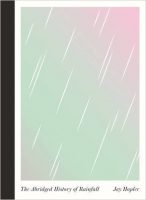
Jay Hopler's second collection, a mourning song for his father, is an elegy of uproar, a careening hymn to disaster and its aftermath. In lyric poems by turns droll and desolate, Hopler documents the struggle to live in the face of great loss, a task that sends him ranging through Florida's torrid subtropics, the mountains of the American West, the streets of Rome, and the Umbrian countryside. Vivid, dynamic, unrestrained: The Abridged History of Rainfall is a festival of glowing saints and fighting cocks, of firebombs and birdsong.
Trébuchet: Poems by Danniel Schoonebeek
[Paperback] University of Georgia Press,168 pp., $19.95
Trébuchet is the much-anticipated follow-up to Danniel Schoonebeek’s debut book of poems, American Barricade, which was named one of 2014’s ten best books of poetry by Poets & Writers and hailed as a “groundbreaking first book that stands to influence its author’s generation” by Boston Review. The poems in Trébuchet―which takes its name from the catapult used to break down walls and barriers during medieval wars―are at once combative and incendiary, tackling contemporary politics in a more direct, personal way than Schoonebeek ever has before. Addressing gun violence, poverty, fascism, surveillance, white privilege, the protest movement, censorship, American history, torture, and net neutrality, Schoonebeek’s writing is marked by a unique use of slang and jargon, manipulation of white space, and precise rhythm on the page. His poems have been praised by many critics for their momentum, obsession with weird language, and the precision of their enjambments and end-stopped lines.
Logotherapy by Mukoma Wa Ngugi
[Paperback] University of Nebraska Press, 96 pp., $15.95
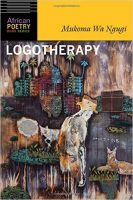
Written as a tribute to family, place, and bodily awareness, Mukoma Wa Ngugi’s poems speak of love, war, violence, language, immigration, and exile. From a baby girl’s penchant for her parents’ keys to a warrior’s hunt for words, Wa Ngugi’s poems move back and forth between the personal and the political. In the frozen tundra of Wisconsin, the biting winds of Boston, and the heat of Nairobi, Wa Ngugi is always mindful of his physical experience of the environment. Ultimately it is among multiple homes, nations, and identities that he finds an uneasy peace.
&luckier by Christopher J Johnson
[Paperback] Center for Literary Publishing, 76 pp., $16.95
In his first collection of poems, &luckier, Christopher J Johnson explores the depths to which we can know our most intimate friends, habits, and—even more so—selves. From a mosaic of coffee cups, dinner engagements, razors, walks around his city, and the wider realm of nature, the poet continually asks to what degree our lives can be understood, our joys engaged with, and our sorrows mitigated. In a voice that is at once contemporary and yet almost primal, these poems seek an affinity with the natural world, the passing of history, and the deepness and breadth of ancestry; they do not question the mystery of life but ask rather how we have become separated from and might return to a more aware place within the frame of it. These are poems rich with metaphor and music but also direct in their voice. Johnson exhibits a poetic tradition that—rather than employing academic allusions and direct personal statements—remains elusive in its use of the poetic “I.” The reader is never certain if they are reading about the poet, their friends, or themselves.
A Poet's Dublin by Eavan Boland
[Hardcover] W. W. Norton & Company, 176 pp., $26.95
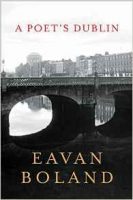
Written over years, the transcendent and moving poems in A Poet’s Dublin seek out shadows and impressions of a powerful, historic city, studying how it forms and alters language, memory, and selfhood. The poems range from an evocation of the neighborhoods under the hills where the poet lived and raised her children to the inner-city bombing of 1974, and include such signature poems as “The Pomegranate,” “The War Horse,” and “Anna Liffey.” Above all, these poems weave together the story of a self and a city―private, political, and bound by history. The poems are supported by photographs of the city at all times and in all seasons: from dawn on the river Liffey, which flows through Dublin, to twilight up in the Dublin foothills.
Written as a tribute to family, place, and bodily awareness, Mukoma Wa Ngugi’s poems speak of love, war, violence, language, immigration, and exile.
Correspondences
A Backward Song
by Stephen Burt

Longlisted for this year’s National Book Award, Blackacre is Monica Youn’s third book of poetry and her first since she left the practice of law to devote herself to writing and teaching poetry full time. It is also her first book to appear since the birth of her son (now nearly two). Her second book, Ignatz—a finalist for the 2010 National Book Award—considered romance, desire, disappointment, frustration, and American landscapes through a series of figures from the great comic strip Krazy Kat (whose recurring antagonist is Ignatz Mouse). The new book takes its title from law, in which “Blackacre” refers to hypothetical real estate (just as “John Doe” refers to a theoretical person). The longest poem responds in fourteen units to the fourteen rhyming end words of John Milton’s sonnet on his blindness. Other poems (eleven in all) respond to François Villon’s “Ballade des pendus” (Ballad of the Hanged Men), portraying dead, dying, posthumous, or mortally-threatened personages. Youn’s compact lines ask us to work—and they reward that work. Her austerities serve a severe beauty and point to a kind of wisdom that no easier, less demanding poetics could frame
No Maps Are Available: Final Scenes with Jim Harrison, Part I
by Peter Nowogrodzki
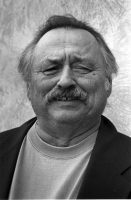
Jim Harrison, a writer who, according to the London Sunday Times, had “immortality in him,” died at the age of 79 on March 26, 2016. Two months earlier, on Valentine’s Day, just about spring in Southern Arizona, I pulled into the poet’s driveway outside the tiny border town of Patagonia. The cholla cacti were showing their spikes, bare of those pretty red and yellow blooms that pop out in April and stay through the summer months. At night, temperatures ducked down to near freezing, and just off old State Route 82, drops of early morning dew hung from a concrete historical marker in honor of Camp Crittenden — established in 1867, the fort was abandoned shy of five years later, after its commander was killed in a skirmish with Cochise’s Apache. Things come and go. By the time of Harrison’s death, the grasslands beyond the sign would be dotted with migratory birds, up from Mexico: rare gray hawks gliding about, colorful warblers in the oak canopies, vermillion flycatchers on branches.
Jim Harrison, a writer who, according to the London Sunday Times, had “immortality in him,” died at the age of 79 on March 26, 2016.
Envoi: Editor’s Notes
"Someone has to glaze a window. . ."
As I write this, it's Election Day in the United States. Unlike previous elections, this one feels existential. I hope that by the time you read this you will note that I was being decidedly far-fetched in saying that. But right now I can't shake that feeling, and so I want to offer up this poem by Wisława Szymborska:
The End and the Beginning
translated by Joanna Trzeciak
After every war
someone has to clean up.
Things won’t
straighten themselves up, after all.
Someone has to push the rubble
to the side of the road,
so the corpse-filled wagons
can pass.
Someone has to get mired
in scum and ashes,
sofa springs,
splintered glass,
and bloody rags.
Someone has to drag in a girder
to prop up a wall.
Someone has to glaze a window,
rehang a door.
Photogenic it’s not,
and takes years.
All the cameras have left
for another war.
We’ll need the bridges back,
and new railway stations.
Sleeves will go ragged
from rolling them up.
Someone, broom in hand,
still recalls the way it was.
Someone else listens
and nods with unsevered head.
But already there are those nearby
starting to mill about
who will find it dull.
From out of the bushes
sometimes someone still unearths
rusted-out arguments
and carries them to the garbage pile.
Those who knew
what was going on here
must make way for
those who know little.
And less than little.
And finally as little as nothing.
In the grass that has overgrown
causes and effects,
someone must be stretched out
blade of grass in his mouth
gazing at the clouds.